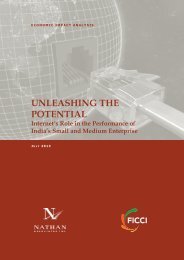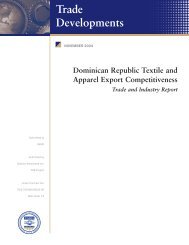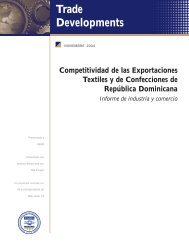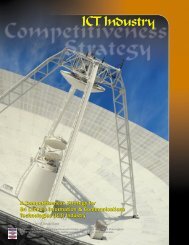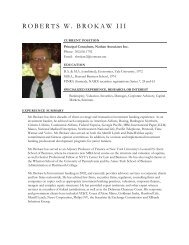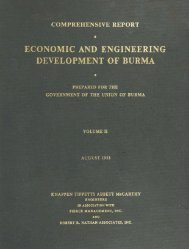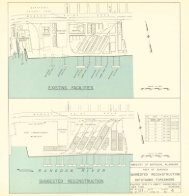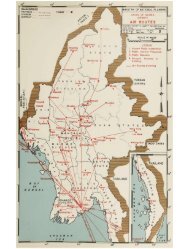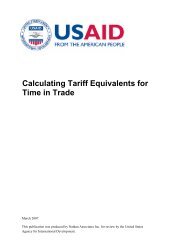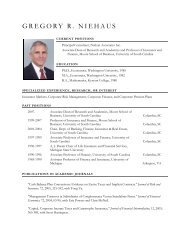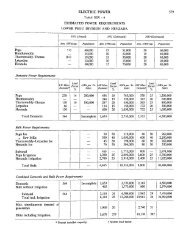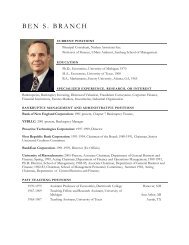Putting it to Work in Developing Countries - Nathan Associates
Putting it to Work in Developing Countries - Nathan Associates
Putting it to Work in Developing Countries - Nathan Associates
Create successful ePaper yourself
Turn your PDF publications into a flip-book with our unique Google optimized e-Paper software.
FREE TRADE AND REGIONAL<br />
INTEGRATION AGREEMENTS<br />
Free trade agreements (FTA) and regional <strong>in</strong>tegration<br />
agreements (RIA) focus on trade liberalization<br />
but often have important effects on<br />
<strong>in</strong>vestment liberalization. First, their trade-liberaliz<strong>in</strong>g<br />
provisions create a broader market for<br />
goods and services than the one that exists <strong>in</strong><br />
any s<strong>in</strong>gle country participat<strong>in</strong>g <strong>in</strong> the agreements.<br />
W<strong>it</strong>h this broader market, greater<br />
economies of scale can be achieved <strong>in</strong> production<br />
of goods and services, and <strong>in</strong>ves<strong>to</strong>rs have an<br />
opportun<strong>it</strong>y <strong>to</strong> earn greater returns. And several<br />
RIAs <strong>in</strong>clude <strong>in</strong>vestment promotion provisions,<br />
featur<strong>in</strong>g, for example, the exchange of <strong>in</strong>formation<br />
w<strong>it</strong>h regard <strong>to</strong> <strong>in</strong>vestment opportun<strong>it</strong>ies<br />
such as privatizations.<br />
Second, these agreements may also conta<strong>in</strong> provisions<br />
for liberaliz<strong>in</strong>g <strong>in</strong>vestment. Indeed, such<br />
agreements often go beyond BITs <strong>to</strong> liberalize<br />
<strong>in</strong>vestment policies or at least <strong>to</strong> elim<strong>in</strong>ate specific<br />
<strong>in</strong>vestment restrictions. This is important.<br />
As emphasized <strong>in</strong> Chapter 5, these restrictions<br />
<strong>in</strong>troduce market dis<strong>to</strong>rtions that discourage<br />
FDI and hamper or dilute <strong>it</strong>s effects on development.<br />
6 FTAs and RIAs are often an effective<br />
framework w<strong>it</strong>h<strong>in</strong> which <strong>to</strong> improve such policies,<br />
w<strong>it</strong>h substantial benef<strong>it</strong> <strong>to</strong> the <strong>in</strong>vestment<br />
climate and an open<strong>in</strong>g up of opportun<strong>it</strong>ies for<br />
foreign <strong>in</strong>vestment. Some develop<strong>in</strong>g countries<br />
welcome this reform while others consider <strong>it</strong> an<br />
impos<strong>it</strong>ion. But a great number of FTAs or<br />
RIAs conta<strong>in</strong><strong>in</strong>g of rules on <strong>in</strong>vestment have<br />
been concluded.<br />
For example, the North American Free Trade<br />
Agreement (1994), FTAs between the Un<strong>it</strong>ed<br />
States and Chile, S<strong>in</strong>gapore, Oman, Morocco<br />
and Australia, and others recently concluded<br />
w<strong>it</strong>h the Dom<strong>in</strong>ican Republic and Central<br />
American countries, as well as w<strong>it</strong>h Peru and<br />
Bilateral Trade and Investment Framework Agreements (TIFAs)<br />
NAFTA negotiations. It also signed TIFAs<br />
w<strong>it</strong>h countries <strong>in</strong> South and Central<br />
America and the Caribbean well <strong>in</strong> advance<br />
of negotiations for a Free Trade Area of the<br />
Americas (FTAA). In recent years, the<br />
Un<strong>it</strong>ed States signed TIFAs w<strong>it</strong>h Algeria,<br />
Egypt, Ghana, Mozambique, Nigeria, Saudi<br />
Arabia, South Africa, Sri Lanka, Tunisia,<br />
Yemen, the West African Economic and<br />
Monetary Union, and the Common Market<br />
for Eastern and Southern Africa. The<br />
ASEAN countries recently concluded simi<br />
lar agreements w<strong>it</strong>h Korea, Japan, Australia,<br />
and New Zealand; Canada and Korea both<br />
have bilateral agreements w<strong>it</strong>h develop<strong>in</strong>g<br />
countries that promote <strong>in</strong>vestment; and the<br />
EU has bilateral cooperation agreements<br />
that aim <strong>to</strong> <strong>in</strong>crease trade and cap<strong>it</strong>al flows<br />
w<strong>it</strong>h develop<strong>in</strong>g countries.<br />
Like other countries, the Un<strong>it</strong>ed States uses<br />
TIFAs <strong>to</strong> structure bilateral consultations on<br />
trade and <strong>in</strong>vestment. These are often considered<br />
a first step <strong>to</strong>ward a BIT or an FTA.<br />
W<strong>it</strong>h their broad coverage of services,<br />
<strong>in</strong>vestment, and <strong>in</strong>tellectual property, FTAs<br />
often require trad<strong>in</strong>g partners <strong>to</strong> undertake<br />
challeng<strong>in</strong>g <strong>in</strong>ternal reforms. The TIFA program<br />
can help identify reforms and reform<br />
strategies. Through a TIFA, the Un<strong>it</strong>ed<br />
States and a trad<strong>in</strong>g partner express certa<strong>in</strong><br />
broad <strong>in</strong>terests such as a desire <strong>to</strong> expand<br />
trade <strong>in</strong> goods and services, adopt measures<br />
<strong>to</strong> encourage trade and create cond<strong>it</strong>ions<br />
favorable for long-term development, or<br />
encourage private sec<strong>to</strong>r contacts and <strong>in</strong>vestment.<br />
The TIFA provides a consultative<br />
mechanism for regular dialogue. The Un<strong>it</strong>ed<br />
States signed <strong>it</strong>s first TIFA <strong>in</strong> November<br />
1987 w<strong>it</strong>h Mexico, nearly four years before<br />
73



